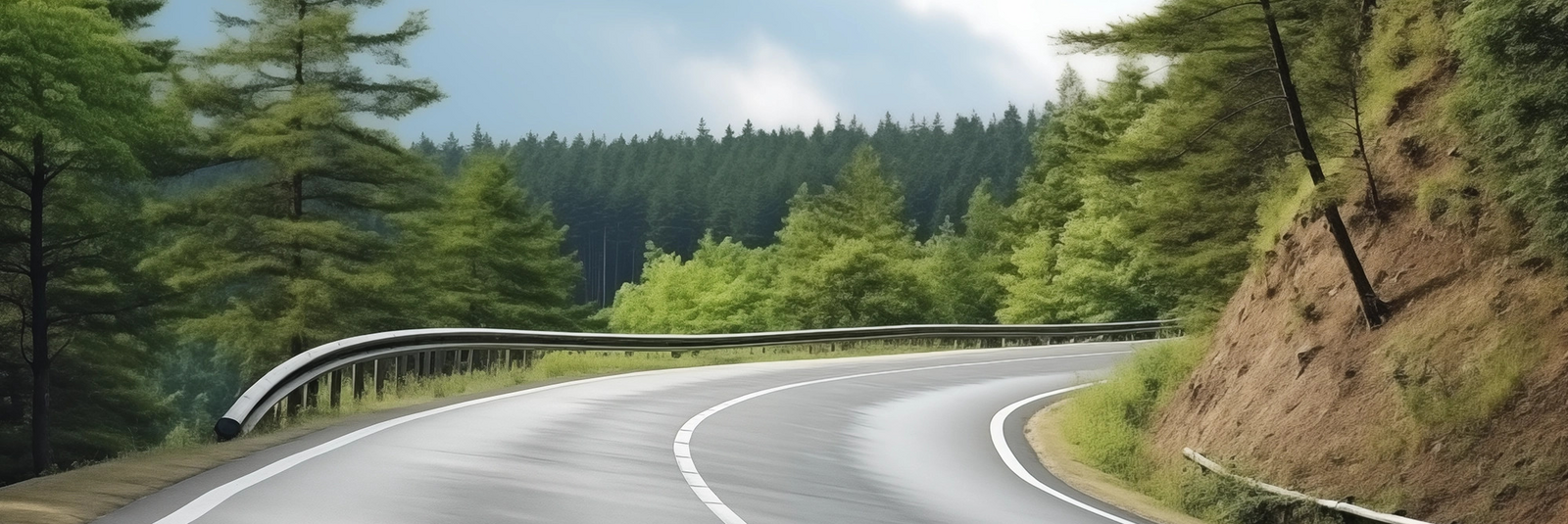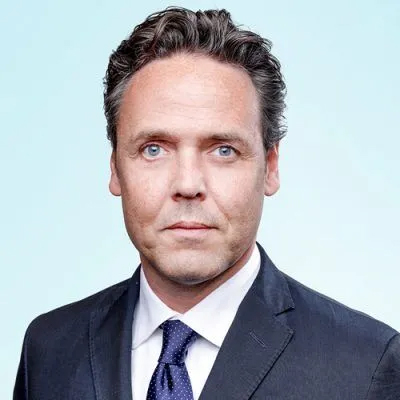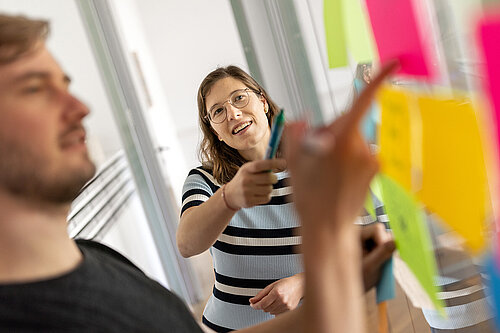
Interview: Business model development "Urban Hubs" at APCOA
As the leading car park operator in Europe, APCOA has built up the largest network of car parks in the last 50 years and thus a profitable business. New trends such as digitalisation, increasing e-commerce, the mobility revolution and sustainability were anticipated and integrated into the corporate strategy at an early stage. Nevertheless, the car park operator's traditional business model is coming under pressure from regulatory requirements such as the diesel driving ban and lockdowns during the pandemic.
APCOA has used this time of change to transform itself from a car park operator into an integrated urban service provider. We spoke to APCOA's Chief Commercial Officer Frank van der Sant about the establishment of urban hubs as a further development of the company's own business model and the digitalisation of parking and mobility.
Henrik Steensen, &Consorten: What exactly are your Urban Hubs?
Frank Van der Sant: These are partial areas in our car parks that we use for more than just typical parking - i.e. for logistics, special mobility applications, charging stations or all kinds of other digital-based services, right through to micro-maintenance.

H: And how did you come up with this idea? It's not so close to the traditional parking business that you usually run, is it?
F: We started thinking about it 4-5 years ago. There were already the first restrictions in cities, for example diesel driving bans. We opened up to new mobility applications - for example, together with the BVG, we are creating a Jelbi Hub in Berlin[note: Jelbi is the central networking of mobility services in Berlin], with car sharing, e-bikes, e-mopeds, scooters, etc., which are kept available and offered in car parks. We received so many requests from different areas that we wanted to structure our services better and conceptualise them.
H: And what exactly does an urban hub look like?Is it a separate area in a city centre car park, or how can you imagine it?
F: That's exactly how you have to imagine it. There are various areas that are B2B-only - especially for logistics projects where pre-picked goods are delivered to the garage by a van or lorry and then split up onto cargo bikes for last mile delivery. This takes place in separate areas that are not accessible to the public. But there are also areas that are specifically available to the public and are traditionally marketed by us as an urban hub and visibly labelled in the garage. Car-sharing vehicles, scooters, bikes or locker boards [note: parcels can be stored and collected here] can be used there.
H:Were you also concerned with topics such as sustainability or "liveable city", or did this develop more by chance or through specific requests?
F: Such topics are already part of our ESG agenda [note: ESG = Environment, Social, Governance], no question. As a car park operator, you tend to be seen as a "bad boy" in the smart city context, which tends to stand for the past. However, we see it the other way round, because many of our car parks, both in the city centre and in the suburbs, are ideal places to provide all kinds of modern services for a smart city. We also invested in our digital platform "Flow" some time ago to create digital access and payment options. And if we combine all that, I think we can play a core role in the smart city context.
H: I understand. Are you working with the same people as before or have you hired new staff?
F: We are in the process of hiring new staff. The logistics topic, for example, sometimes requires a high level of detailed knowledge in order to understand the exact processes. And in order to be able to talk to our partner companies on an equal footing, we have now hired a few specialists with expertise in this area. This means we can now define processes together, as cost efficiency is very important in the logistics sector.
H:What would you say were the key factors that got you off to such a fast start? What 2-3 success factors did you look at?
F: It has to be said that during this COVID phase, when our traditional business tended to be quieter, we used the time to think about this in detail. The other thing is that we are an organisation that is clearly business-driven. In the past, we have worked with you to develop initial business plans and looked at: what are the market opportunities? Where are there opportunities for growth? In which markets is it e-commerce? What about scooters and self-storage? And together we then drew up very ambitious business plans as ideas for the respective countries, which also highlighted the potential that this business holds for us as a car park operator. As a result, every person with P&L responsibility [note: profit and loss] saw that the figures are relatively large and that we don't want to leave this potential lying around on the street, but want to tap into it.
H: But it is also a change for one or two sceptical people. Have you invested in this?
F: Yes, of course it is a change, in terms of mindset. But as you know, our organisation has been undergoing some changes for years, also due to different ownership structures. But now it's a change that has a very positive impact. Previously, changes were more in the sense of: We look for further cost optimisation measures, where can we achieve further efficiencies, where can we change business processes with shared services? And in order to work more cost-efficiently, this is a change that is focussed on the top line and therefore creates positive momentum. We have worked very intensively with you on this, also as part of the new Group strategy that we have set up, in which we have also anchored the topic of urban hubs very centrally. And ultimately, we said during the pandemic: we're not going to play defence by thinking that fewer people are parking now and we have to make sure that we maintain our turnover. Instead, we have said that we are clearly playing this aggressively forwards and see this opportunity as a clear growth driver. We wanted to be at the forefront and we have done this very well in this entire change management programme, including the new strategy, so that it has also been received very positively by our colleagues everywhere.
H: Do your sales people play an active role with new partners or do they only make contact when you are asked?
F: We are actively going out and have started to structure the use cases properly. We have also hired new colleagues to develop individual products from them. But first we look at the individual use cases - for example, self-storage: we first determine the key players that already exist in this market. Then our sales organisation addresses these key players and a conversation ensues - this is still partly classic cold call business.
H: It's a different logic to switch from car park owners to e-scooter operators. Was that a big change for your sales people? Are you enabling them?
F: Yes, as I said before, on the one hand we hired new sales people who come from these markets, ideally with the relevant network in the segment. And on the other hand, we have enabled our existing sales force through various materials such as online lessons and lots of training. Of course, not just anyone is suitable for this. You have a lot of contact with start-ups and there the approach, the type of communication, the speed with which answers are required, the flexibility is somewhat different than in a very, very conservative property industry, where time is relative (sometimes).
H: You said that your company is based on your tech platform in the background. Can you say something more about that? Are you now becoming the app store of the parking industry?
F: Well, it's not quite like that (laughs). We launched our digital platform Flow in 2016 and made it available as a platform in all our garages in Europe. In my opinion, it is primarily a back-end platform that digitalises practically all of our garages. We can see all transactions live, directly in a data warehouse. This controls the opening and closing of barriers and price tables. And for many use cases, we can report transactions to the partner organisations in real time. If you think of a car-sharing organisation, then of course it needs to know where a car is parked, when it drives in somewhere and when it is dropped off somewhere. The same applies to logistics companies. They want to know when their goods are picked up, when they are driven out, how many transactions there are. And we measure all of that.
Frank van der Sant on the sustainability aspect of the Urban Hub concept
H: Who is your clientele? Who is approaching you?
F: We are talking about practically all car-sharing and car-rental companies (e.g. Sixt, mobileeee, DriveNow). And in the logistics sector, all the brands you can imagine. For all of them, it's about last mile logistics, and e-commerce orders have increased dramatically, especially in COVID times. Your DHL parcel deliverer will tell you that she now delivers an average of 200 parcels a day, whereas in the past it tended to be 120-130 parcels a day and maybe 200 parcels a week before Christmas. This naturally means that logistics companies have the challenge of driving their vans into the city centre, which cities don't want due to traffic jams and additional emissions.
H: And is this only possible in Germany, or do you also do this across Europe?
F: We do this across Europe, although it has to be said that there are different stages of development in the various use cases in different countries. For example, there is a very high demand for e-scooters and charging in Germany and Scandinavia, whereas in the UK and Ireland it was still practically prohibited and is only just beginning.
H: How has this reorientation been received by your organisation in recent months?
F: First of all, I have to say that traditional parking remains our absolute core business. And it's not that we want to abandon this, but quite the opposite: we need the traditional parking business and the car parks/locations in order to provide urban hub services as well. Of course, there were a few traditionalist doubters in our organisation at the beginning who saw the many problems as well as the innovation. But thanks to our reorientation and the associated growth, there is also a certain positive energy in our company and this development has been very well received by us.
Frank van der Sant on the technological platform behind Urban Hubs
H: How does it work for me as an end customer if I rent a car-sharing car from share now at your Urban Hub? DoI still have to deal with a paper ticket?
F: No no, it all works digitally. If you think about car sharing or scooters, these are classic services that are generally only app-based today. And we work with our platform API interfaces[note: application programming interface] with our partner company apps so that barriers open automatically without the need for paper tickets, and we do the billing with these companies in the background, sometimes on a monthly basis. And that's why I say that this really is an enabler for many of our services.
H: You said it's digital. Is that an AI-based solution at the barrier or how do you ensure that the barrier actually opens at the end?
F: We work with cameras and licence plate recognition. Unfortunately, Germany is the last remaining country in the group where cameras are not yet installed everywhere to recognise number plates...
H: I'm also asking because not everyone in Germany knows about this.
F: This was a hot topic in Germany for a long time due to data privacy and security. I remember we set up the first cameras five years ago, until a lawyer complained in court and we had to take them down again with plastic bags. In the meantime, however, it has been fully accepted in Germany. Nevertheless, for us as a car park operator that is active practically throughout Germany, it always requires individual approval with the respective local state data protection officers.
H:Then I'll ask you one last question. What was the coolest moment for you in your Urban Hub Journey?
F: You know, we invested a lot of time in these business plans - what are the growth rates, what can we really mine from them? And at the time, everyone said we had to get in touch with the countries quickly. But I always said at the time that we really had to work it out in great detail - only then could we present ourselves to the countries with maximum credibility, and only then could we get their buy-in. When we then had all the discussions with the countries and presented our ideas to them in detail, and also showed them pilot cases from other countries for each case, and the countries then actually all said: "I believe in it, it has potential" - by the way, we are currently already in year 3 of our 5-year plan, which we set ourselves and launched in February, which we have already signed. That's how fast the business is moving, it's practically exploding... But the moment when the countries said that it's not that the people from the ivory tower have come up with something fancy with their consultancy firm, which is totally unrealistic, but that they said "I buy the concept, I buy the figures, I believe in it, let's get started," that was ultimately the best moment for me.
H: Cool, thanks Frank.
Frank van der Sant on the moment he remembers most from the Urban Hubs Journey




